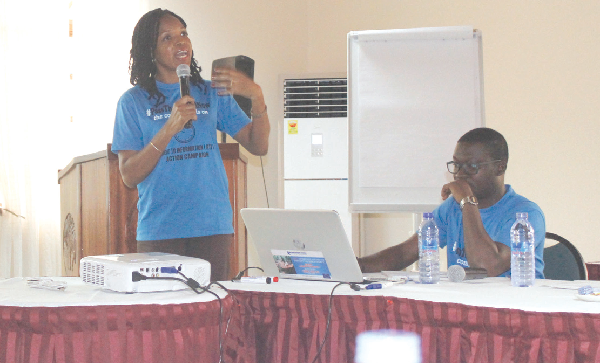A member of the Civil Society Organisations (CSOs) Platform on the Sustainable Development Goals (SDGs), Ms Ugonna Ukaigwe, has urged ministries, agencies and departments (MDAs) to respond to enquiries by e-mails when they receive them from the public.
She said some MDAs had decided not to respond to e-mails as they insisted on hard copies for all correspondences.
She said when the Right to Information Bill (RTI) was passed, that preference would have to change and MDAs would have to learn to acknowledge receipt of emails and respond to them.
She was speaking on Principles of the RTI Bill at a media engagement organised by the RTI Action Campaign.
The campaign brings together civil society organisations, such as the Ghana Integrity Initiative (GII), the Centre for Democratic Development (CDD)-Ghana, SEND Ghana, and the Ghana Anti-Corruption Coalition (GACC), among several other actors.
RTI Law
Ms Ukaigwe, in her submissions, said an RTI Law was for the benefit of all citizens.
Sharing general principles that any RTI law should have, she said maximum and proactive disclosures, as well as limited exemptions were some of the basics.
She expressed the opinion that with an RTI regime, government agencies would have to proactively disclose information concerning contracts, permits and all other information generated by them on behalf of citizens.
Developmental law
In a review of the RTI 2018 Bill, the Director of Advocacy and Policy Engagement at CDD-Ghana, Dr Kojo Asante, stressed the fact that an RTI Law was a development law and a law for citizens.
He said the law would revolutionise the recording, keeping and management of information in Ghana.
That was because it was going to place an obligation on institutions to within 12 months from the date of the coming into force of the law “compile and publish up-to-date information in the form of a manual” of information to be accessed.
“For me, this is the game-changer, this law now will require that agencies generate certain types of information, keep them, manage them so that we can have access to them,” Dr Asante said.
Opportunities
The Executive Director of the Parliamentary News Africa (PNAFrica), Mr Sammy Obeng, in his submissions on how the RTI had fared since its introduction in Parliament in February 2010, said the bill had been one of the most abused in Parliament.
According to him, when the bill reappeared in the 6th Parliament, the committee report laid on December 2014 saw no action for a year and one month, although Article 106 (14) of the Constitution stated that such a report should not be delayed for more than three months.
Mr Obeng said there were, however, opportunities for journalists to engage with Parliament for the passage of the RTI Bill as a record had been set with the quick passage of the Special Prosecutor’s Act.
Threat
The Chairman of the RTI Action Campaign, Mr Seth Ablosoo, said corruption was a threat to the country’s democracy and had to be vigorously fought against through laws such as the RTI.
He said issues with the bill had been raised with the joint committees of the Constitutional, Legal and Parliamentary Affairs and Communications.
He added that the RTI Action Campaign was awaiting its final report to see if the concerns had been incorporated before further action was taken.
The Executive Director of the GII, Mrs Linda Ofori Kwafo, noted that the engagement was part of a series to be undertaken in all regions and districts with civil society organisations in anticipation of the passage of the bill.
Journalists pledged to support processes in the passage of the bill by highlighting it in discussions, writings and interviews with duty bearers.

